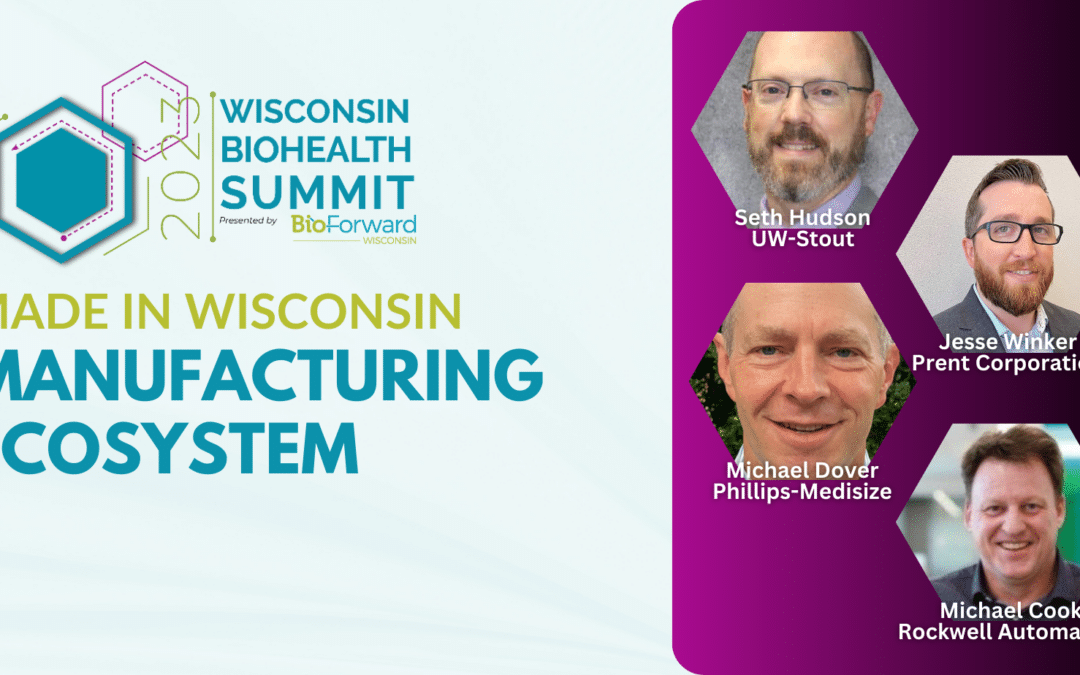A significant strength of Wisconsin’s biohealth industry is its robust local manufacturing ecosystem. The state is home to a thriving network of companies specializing in automation, robotics, precision manufacturing, packaging, and plastics. In 2021, Wisconsin suppliers provided over $6 billion in goods and services to Wisconsin biohealth companies, underscoring the critical role of this supply chain in supporting the state’s burgeoning biohealth sector. This session explored Wisconsin’s biohealth supply chain leaders and what truly makes products “Made in Wisconsin.”
Seth Hudson, Executive Director for Corporate Relations and Economic Engagement, Discovery Center, University of Wisconsin-Stout:
Seth Hudson, in his presentation on “UW-Stout’s Polytechnic Focus,” shed light on the distinctive nature of the University of Wisconsin-Stout, the state’s only public polytechnic institution. This public polytechnic is not your typical four-year university. Its mission is defined by its Polytechnic Distinction, characterized by applied learning and research, hands-on education, business and industry collaboration, and career-focused experiences. UW-Stout’s Polytechnic Advantage was evident in its practical experience, state-of-the-art university facilities, program advisory council, industry partnerships, and high employment rates among its graduates.
Jesse Winker, Director of Product Development, Prent Corporation:
Jesse Winker introduced the Prent Corporation, which has a rich history dating back to 1967 when it was founded in Janesville, Wisconsin. Today, Prent is the largest global custom thermoformer for medical devices, boasting 12 facilities worldwide. Vertical integration is a key feature of the corporation, covering sheet extrusion, tool build, machine build, product design, cleanroom manufacturing, custom medical packaging, high-end consumer electronics, and automated transport totes. Prent’s commitment to quality and innovation has made it a significant player in the biohealth manufacturing sector.
Michael Dover, Director of Manufacturing Technology, Phillips-Medisize:
Phillips-Medisize is a global company with a wide reach. With 30 manufacturing locations across the Americas, Europe, and Asia, it employs over 7,500 people and generates more than $1.4 billion in annual revenue. The company specializes in in-vitro diagnostics, pharma drug delivery, automotive, defense, consumer diagnostics, and more. They take pride in delivering engineered products that have a positive impact on millions of lives. Their services span concept, design, and development, with an emphasis on human factors engineering and quality standards to meet the complex and evolving needs of the biohealth industry.
Michael Cook, Director Academic Enablement, Rockwell Automation:
Rockwell Automation, an organization with a long and storied history, began its journey in 1893 with a focus on automation and technology. Over the years, it has evolved into a global leader in the automation industry, expanding human possibilities. The company’s milestones include pioneering significant innovations, acquiring key technology and engineering capabilities, and launching groundbreaking products.
Rockwell Automation’s global presence is evident in its innovation centers, research and development facilities, and manufacturing locations. The company is committed to helping customers introduce and scale new products quickly and effectively from anywhere in the world.
With an extensive history and global reach, Rockwell Automation continues to shape the future of automation and manufacturing. They aim to bring possibilities to life through their innovative products and services.
The morning panels at the Wisconsin Biohealth Summit showcased the state’s manufacturing prowess and the vital role it plays in the biohealth industry. The presentations from UW-Stout, Prent Corporation, Phillips-Medisize, and Rockwell Automation illustrated the impressive capabilities and expertise of Wisconsin’s manufacturing ecosystem.
Stay tuned for the next part of this blog series, where we’ll explore more sessions and insights from the Wisconsin Biohealth Summit.





